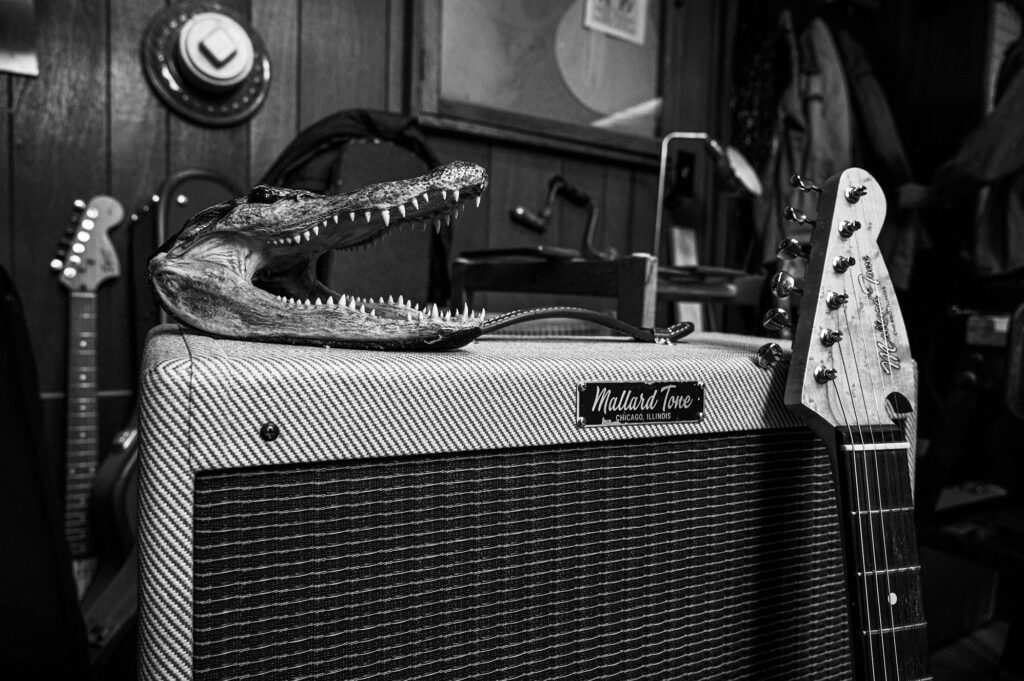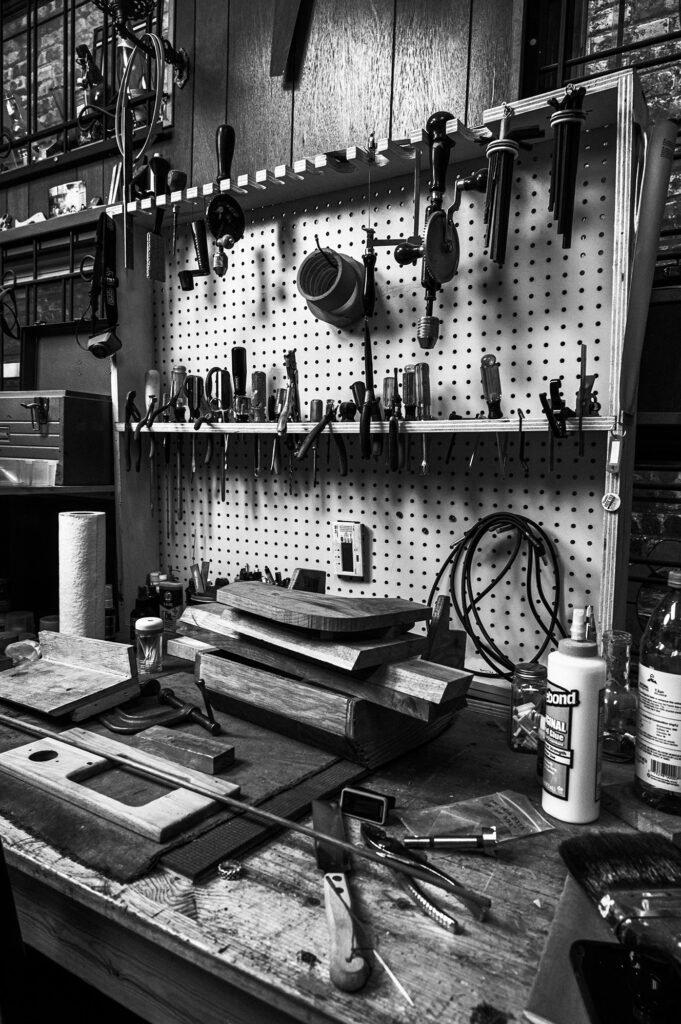For Jonah Pennigroth, the Luthier behind Chicago’s Svetle Instruments, the chance to collaborate with Pinksqueeze bassist Anna Claire White on a custom bass guitar was a dream project. The catch? Penningroth only had three weeks to complete the bass before Pinksqueeze’s 2024 summer tour.
“These instruments start out as blocks of wood,” said Penningroth. “[The build] was a huge challenge, and I was so pressed.”
Penningroth and White collaborated on a full blueprint for the instrument, with White, who is also a visual artist, adding her signature illustrations as needed. With a clear vision in place, Penningroth began the intensive process of shaping wood, metal and other raw materials into a road-ready custom instrument. Even if the deadline was met, the bass would need to survive every circle of instrument hell that is modern touring. One misaligned piece or faulty sprew could herald catastrophe.
“Every big moment [working on the bass] felt very do or die.”
But White’s build was also everything Penngigroth looks for in a project; a clear objective from a working creative, the chance to build something that pushes boundaries and a little bow of danger to keep things interesting.
“This is all about the artist. My dream is to work exclusively with artists who actively create art,” Penningroth says. “I want my instruments to be played and used by artists long after I’m gone.”

Penningroth, 27, is part of a new wave of young luthiers serving Chicago’s music scene. White’s hectic build is just another day servicing Svetle’s eclectic clientele, which Penningroth describes as “punks and cowboys.”
Penningroth is quick to geek out on Chicago guitar history, so the chance to carry on the city’s instrument making tradition is just as exciting as a new custom build.
“Did you know Chicago was once the guitar making capital of the world?”
Chicago was a hotbed of instrument production from the 1930s all the way to the 1960s. National, Supro, Harmony, Kay and Silvertone instruments produced were by the thousands. The industry would shift towards overseas production, Chicago’s luthier tradition continued in a smaller smaller workshops and solo artisans.
Penningroth found their way into the luthier community through amps rather than guitars.
“For whatever reason, I became obsessed with amplifiers. I then decided to make one of the weirdest amp rebuilds out there and everything just flowed from there.”
Penningroth trained under Ian Schneller at Specimen Productions in Humboldt Park. Schneller is a local legend, one of Chicago’s premier instrument builders with a history in the scene stretching back to the 1980s.
Penningroth was able to pick up the instrument building fundamentals quickly despite not having any woodworking experience. They say the process of working wood into guitars isn’t too far off from clay sculpting. But it’s not all zen in the luthier world.
“Want to hear some tea?” Penningroth teases.
Yes. Of course. Always.
“There is an older generation of luthiers in Chicago that despise each other. But I think that this new generation is really trying to change that vibe.”
Penningroth keeps a close relationship with fellow Specimen alum Shane Morris. “Close” as in, they work only a few feet away from eachother.
“We share a private studio space in Lake View,” Morris says. “We spend a ton of time working on our own projects in the same room. There is plenty of tool sharing and tips and tricks going back and forth.”

Morris, 27, who operates as Spicetown Guitars, specializes in acoustic guitar design and construction. He credits everything he knows about acoustic guitars to mentor Ron Bieganski, whom he met at Specimen. Morris would spend five years studying under Bieganski. His first successful acoustic guitar was built in tribute to his late grandfather.
“My Grandfather was a St. Louis Cardinals fan so that was the inspiration for the build. I designed a bird shaped headstock and bridge, and used Cherry and Bloodwood for the sides and binding. My favorite part of this build is the inlay at the 12th fret. I mixed my grandfather’s ashes with red epoxy and made it into a double cardinal inlay.”
Morris still keeps in touch with Bieganski, and now has his own protege.
“I also have an apprentice, John Thro, who has been working with me for almost two years now. He kind of started off shadowing, then moved on to his own projects, and now he is taking on his own repairs and even a few commissions from me when I’m backed up.”
Think you have what it takes to make instruments? It takes a mountain of practice and a willingness to experiment, says Morris.
Marc Haynes, 34, who runs Mallard Tone Guitars, also found instrument making through a desire to experiment.
“I’m not a fan of new factory-made guitars because the quality control just isn’t what it used to be. Big-name brands are always trying to see what they can get away with by cutting costs and charging more. I started developing this mentality of, ‘Why not just do it myself?’” he says.
At the core of the “Schneller method” is a commitment to the details. That means hand manually-wound pickups and non adjustable steel necks. Nothing is mass produced and everything has a personal touch.
“I want to build guitars and amplifiers that celebrate craftsmanship, that are made here in Chicago, a city with a rich history of guitar manufacturing. Quality, serviceability, and minimalism are three principles I want to abide by. I believe Chicago is coming back to that level of creativity with all the incredible builders coming out of here. It gives me a great deal of pride to be a part of it.”
Another core Schneller tenant? An open-door policy to anyone interested in making guitars regardless of experience level.
“[Schneller] was the only one in Chicago willing to take me under his wing when everyone else turned me away. I am always grateful to him and have had some of the best years of my life being his friend, an apprentice, and learning his methodology.”
To Haynes, the bond between fellow luthiers can be uniquely fulfilling.
“Jonah over at Svelte Instruments is a very dear friend and mentor of mine. Every week for over two years we build together, share ideas and discuss Aspirations.”
“I’d say we have different tastes in aesthetics which is wonderful in a creative sense but we’re consistently on the same page, focused, driven and continue pushing one another towards success. Without Jonah, I genuinely wouldn’t be where I am, and they’ve always had my back when I’m stuck somewhere and don’t know how to proceed. Jonah’s a talented musician and has used my gear for multiple shows and I can’t express how grateful I am for such an awesome opportunity to be a part of their music.”

Like fledgling tattoo artists need brave souls willing to be living sketch pads to practice on, local luthiers are always in need of bands willing to field test gear. Musicians themselves, Penningroth, Morris and Haynes are acutely aware that the hours of winding, and sanding and sculpting are worthless if the instrument doesn’t feel right to the player.
“You feel like a part of the band and a part of the music,” Haynes says.” I love getting feedback and everyone who plays my gear has been incredibly kind and sincere.”
“When I’m watching someone play my guitar, through my amp with my pickups all I can think of is, “Wow, I made that!” You’re not hearing that Fender or Gibson tone; you’re hearing pure Mallard Tone. And let me tell you, it’s incredibly refreshing to hear.”
To Morris, staying afloat with new projects is all about momentum.
“Building my clientele has largely been a grassroots operation. Like most of my experience, it snowballed from just my close friends to people we were playing shows with, to friends of theirs and so on. At this point I do a ton of work for gigging musicians around Chicago, as well as some touring bands. I have built myself a good word of mouth following and my clientele is constantly growing outside of that as well.”
Running a workshop, even a small one, is a massive financial undertaking. From tools to materials to the odd trip to the doctor to reattach a pinky; to get a shop solvent is as difficult as getting a lead guitarist to show up on time to practice. Well, maybe not that hard.
“[I have} just gotten to the point where I can sustain myself monetarily while working independently,” Morris says. “The answer is simply to buy these expensive tools as I need them. If I can’t afford the tools I need, my mentor Ron lets me borrow some of his, although this slows things down substantially. I’ve found that time and patience are the key to growth, and I’ve certainly learned how to exercise my patience muscle through working as a luthier.”
Even with years of training and practice, Haynes says self-doubt can derail a project worse than a faulty set of tools.
“The fear I face is more about those critical moments in a project where I second-guess myself, hesitating to take the next step. I’ll overthink it, pivot to another task, and wait until I feel ‘ready.’ But recently, a friend gave me a wake-up call: ‘Just do the damn thing.’ That advice hit hard, and it’s been a game-changer. Every time I push through that fear, I realize it was never as daunting as I made it out to be. It’s a reminder that courage isn’t the absence of fear—it’s acting in spite of it.”
Chicago’s young luthiers have learned to push through the fear, self-doubt and bullshit by pulling each other closer… and build some damn good guitars in the process.
“This world is such a nightmare right now, so I feel like the least we can do is build community and grow together,” Penningroth.









